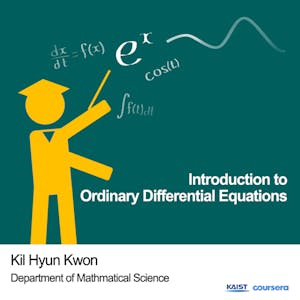This introductory course on (Ordinary) Differential Equations provides a comprehensive understanding of basic terminologies, concepts, and methods for solving various types of differential equations, along with essential knowledge of underlying theory and practical applications. The course is designed for individuals seeking practical applications of differential equations in their respective fields and requires a background in calculus and elementary matrix theory.
The course is structured into nine modules, covering topics such as order and normal form, first and second-order differential equations, mathematical modeling and applications, and more. Each module includes video lectures, examples, and quizzes to reinforce learning.
Certificate Available ✔
Get Started / More Info
This course comprises nine modules, covering topics such as introduction to differential equations, first and second-order differential equations, mathematical modeling, and practical applications.
This module introduces the concept of differential equations, covering topics such as order and normal form, linear and nonlinear equations, solution types, and initial value problems. The module also discusses Picard's Theorem and includes quizzes for assessment.
Module 2 focuses on first-order differential equations, including separable equations, integrating factors, exact equations, and examples. It also explores the unique existence of solutions and includes quizzes to reinforce learning.
Module 3 delves further into first-order differential equations, covering integrating factors, substitutions, homogeneous equations, Bernoulli equations, and more. The module also includes quizzes for evaluation.
Mathematical modeling and applications are the focus of Module 4, exploring topics such as radioactive decay, population dynamics, and their practical implications. The module includes quizzes for assessment.
Module 5 provides an in-depth understanding of linear second-order equations, discussing linear differential equations, superposition principle, unique existence of solutions, and more. Quizzes are included for assessment.
This module continues the exploration of linear second-order equations, covering fundamental set of solutions, general solutions, nonhomogeneous equations, reduction of order, and homogeneous linear equations with constant coefficients. Quizzes are provided for assessment.
Module 7 focuses on the method of undetermined coefficients, variation of parameters, and their application to linear second-order equations. The module includes quizzes for evaluation.
Module 8 further delves into variation of parameters and its application to linear second-order equations, providing examples for better understanding. Quizzes are included for assessment.
Module 9 explores the practical applications of second-order equations, such as the spring-mass system, free and forced damped motion, and the pendulum. Quizzes are included for evaluation.
This course provides a foundational understanding of essential math for Data Science, covering algebra, calculus, linear algebra, and numerical analysis.
Explore the fascinating world of digital image and video processing, from the technology behind digital cameras to the use of special effects in Hollywood movies...
Mathematics for Computer Science is an essential course covering number bases, sequences, modular arithmetic, and graph sketching. It provides the foundational mathematical...
This course delves into trigonometry and analytical geometry, exploring their practical applications. Participants will gain a comprehensive understanding of trigonometric...